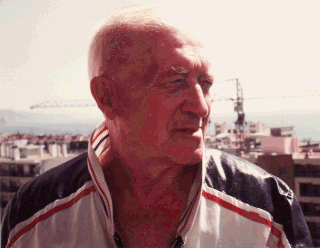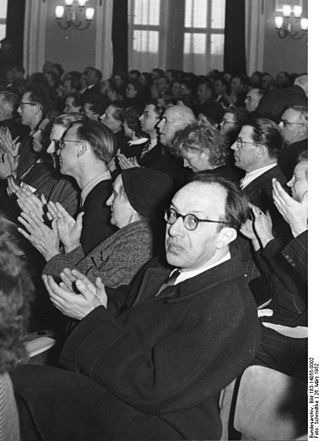Erwin Ratz was an Austrian musicologist and music theorist. He is known especially for his work as president of the Gustav Mahler Gesellschaft and for his book Einführung in die musikalische Formenlehre. During Nazi rule, he saved the lives of several Austrian Jews by sheltering them in his apartment for a number of years.
Julius Leopold Korngold was an Austrian music critic. He was the leading critic in early twentieth century Vienna, serving as chief music critic of the Neue Freie Presse from 1904 to 1934. His son was the composer Erich Wolfgang Korngold, whom he named after Wolfgang Amadeus Mozart, one of his favorite composers.

Egon Joseph Wellesz CBE was an Austrian, later British composer, teacher and musicologist, notable particularly in the field of Byzantine music.
Hans Erich Apostel was a German-born Austrian composer of classical music.

The University of Music and Performing Arts Vienna is an Austrian university established in 1817 located in Vienna.With a student body of over three thousand, it is the largest institution of its kind in Austria, and one of the largest in the world.

Max Deutsch was an Austrian-French composer, conductor, and academic teacher. He studied with Arnold Schönberg and was his assistant. Teaching at the Sorbonne and the École Normale de Musique de Paris, he influenced notable students such as Philippe Capdenat, Donald Harris, György Kurtág and Philippe Manoury.
Colorado MahlerFest is an annual event held in Boulder, Colorado, which each year celebrates one major symphonic work by Austrian composer Gustav Mahler. While "Colorado MahlerFest" is the official name of the event and the organization, the individual annual events are simply referred to as "MahlerFest", followed by a Roman numeral. It is the one of only two North American arts organizations to have received the Gold Medal of the International Gustav Mahler Society (the other being the New York Philharmonic. The founder of MahlerFest was conductor Robert Olson, who currently serves on the faculty of the University of Missouri–Kansas City who led the festival until his retirement in 2015. Kenneth Woods succeeded Olson as Artistic Director in 2016.

Mahler is a 1974 British biographical film based on the life of Austro-Bohemian composer Gustav Mahler. It was written and directed by Ken Russell for Goodtimes Enterprises, and starred Robert Powell as Gustav Mahler and Georgina Hale as Alma Mahler. The film was entered into the 1974 Cannes Film Festival, where it won the Technical Grand Prize.
Rudolf Kolisch was a Viennese violinist and leader of string quartets, including the Kolisch Quartet and the Pro Arte Quartet.

Sechs kleine Klavierstücke, Op. 19 is a set of pieces for solo piano written by the Austrian composer Arnold Schoenberg, published in 1913 at Universal Edition in Vienna.
The Arnold Schoenberg Choir is a Viennese/Austrian choir which was founded 1972 by Erwin Ortner, who is still its artistic director. The choir has a high reputation both among conductors and among critics and the musical scene in general. All members of the choir have broad experience and expertise in vocal music; most of them have graduated from or are currently studying at the Vienna University of Music and Performing Arts. The choir is named after Viennese composer Arnold Schoenberg.

Joseph Beer was a composer who worked mainly in the genres of operettas, singspiele, and operas.

Christian Gerhaher is a German baritone and bass singer in opera and concert, particularly known as a Lieder singer.
Martin Eybl is an Austrian musicologist.

Alexander Zemlinsky or Alexander von Zemlinsky was an Austrian composer, conductor, and teacher.

Matthias Bertsch is a German-born Austrian musicologist, musician and professor at the University of Music and Performing Arts in Vienna. He is the President of the Austrian Society for Music and Medicine.
Christian Kostal León de Castillo is an Austrian-Mexican tenor, conceptual artist, musicologist and artistic director.

Georg Knepler was an Austrian pianist, conductor and musicologist.

Michael Frischenschlager is an Austrian violinist.
Stephan Matthias Lademann is a German pianist and academic teacher.











